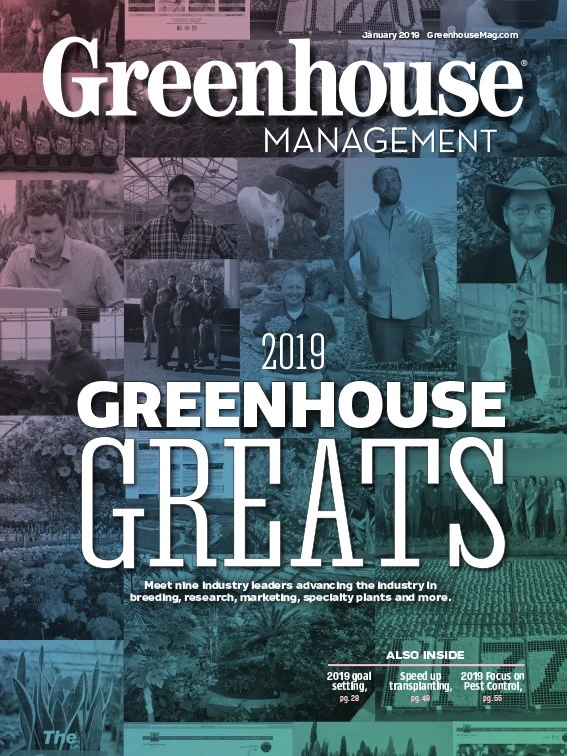

WHY HE’S GREAT: At 16 years old, Nathan Nordstedt owned a greenhouse business, Countryside Plants, in his hometown of Halstead, Kansas — four years after his great grandmother helped instill in him an interest in horticulture. By now, at age 25, the PhD student in floriculture crop improvement at The Ohio State University has seen his share of the inner-workings of the horticulture industry and is committed to contributing his own increasing knowledge and expertise to move the industry forward.
Nordstedt attended Kansas State University for his bachelor’s in horticulture science, and he interned at both Iseli Nursery in Boring, Oregon, and Ball Horticultural in Columbus, Ohio. He also studied abroad for six months at the Czech University of Life Sciences in the Czech Republic, and has received numerous awards, attended various conferences and served in several leadership roles.
WRAPPED UP IN RESEARCH: Stationed at Ohio State’s Ohio Agricultural Research and Development Center in Wooster, Ohio, Nordstedt conducts molecular biology and plant physiology research under the advisership of Dr. Michelle Jones, professor, extension specialist and D.C. Kiplinger Floriculture Endowed Chair. Nordstedt studies how Pseudomonas and other beneficial bacteria can reduce low nutrient and post-harvest drought stress in floriculture crops.
“I was given a broad area of beneficial bacteria, greenhouse crops — where did I want to go with that?” Nordstedt recalls. “I have a lot of interest in plant physiology as well, and how plant physiology and studying that can fit into my project, so that’s where I went with more of the abiotic stress side of things. We started with drought stress, and I was interested with how these bacteria could alleviate drought stress in plants, and then specifically what’s happening with the plant.”
MOLECULAR MOTIVATION: With an expected graduation date in spring 2021, Nordstedt is still unsure if he wants to work in the industry or in academia. He says he has learned not to make specific plans too far in advance because they are susceptible to change. But if he had to choose right now, he says he would want to work at a company where he could look at how molecular biology can improve horticulture crops.
“Those types of tools have been used in field crops for years, and horticulture companies are really starting to be able to afford those kinds of things, with all of the specialty crops that we produce, but are [also] learning to start to take advantage of those,” Nordstedt says. “I want to jump in on that and see how we can start using molecular biology for floriculture crop improvement.”
WORKING IN AN INDUSTRY THAT EMBRACES YOUNG PEOPLE: Nordstedt says he thinks the horticulture industry does a great job of supporting young professionals within it — more than many other industries. He also believes those within the field need to encourage new people to enter it. He says he has noticed a perception from outside the industry that horticulture lacks in job opportunities and doesn’t pay well. But, he says, while professionals in horticulture probably will not become rich, they will make a comfortable living. So often, too, they love what they do and establish valuable connections.
“It amazes me, going to these conferences that I go to, and trade events,” Nordstedt says. “You take Cultivate, for example. You go in there, and it’s this ginormous trade show. Everyone is everyone’s friend there, whether you’re competitors — no matter who you are. Everyone is just friends with each other. It’s a very unique aspect to our industry, and that’s why I love it, and that’s why I don’t see myself going anywhere else.”

Explore the January 2019 Issue
Check out more from this issue and find your next story to read.
Latest from Greenhouse Management
- Anthura acquires Bromelia assets from Corn. Bak in Netherlands
- Top 10 stories for National Poinsettia Day
- Langendoen Mechanical hosts open house to showcase new greenhouse build
- Conor Foy joins EHR's national sales team
- Pantone announces its 2026 Color of the Year
- Syngenta granted federal registration for Trefinti nematicide/fungicide in ornamental market
- A legacy of influence
- HILA 2025 video highlights: John Gaydos of Proven Winners





